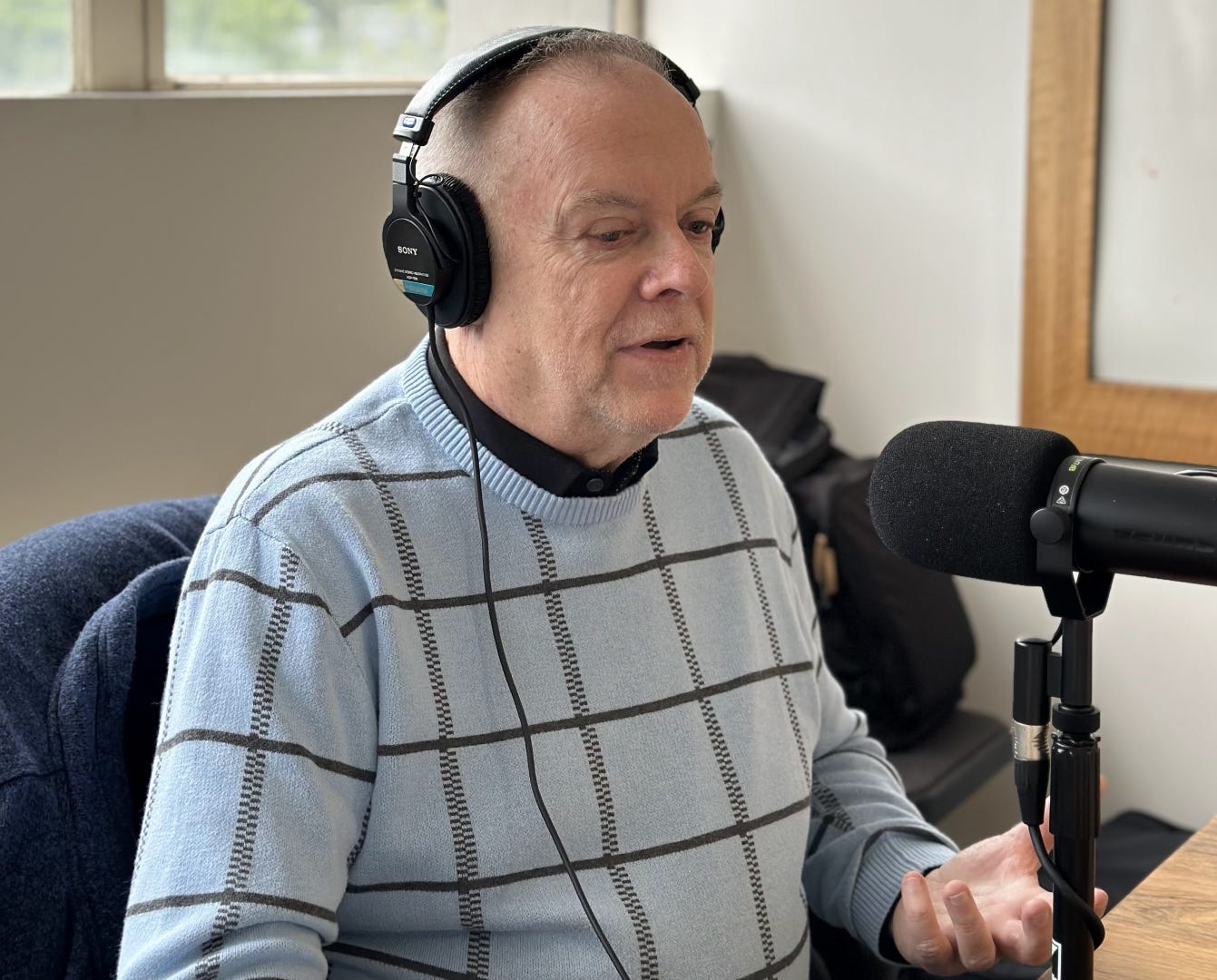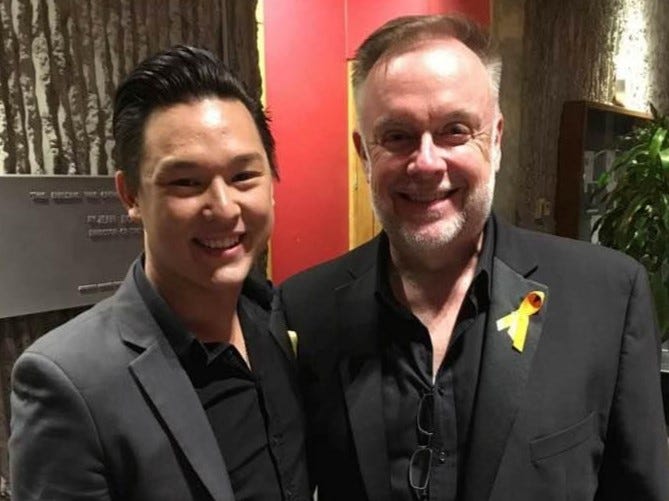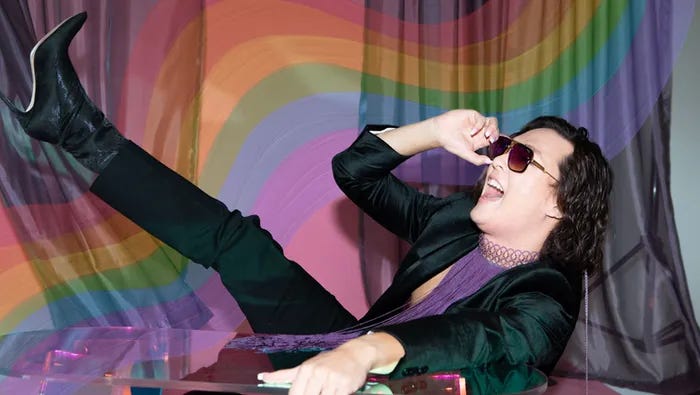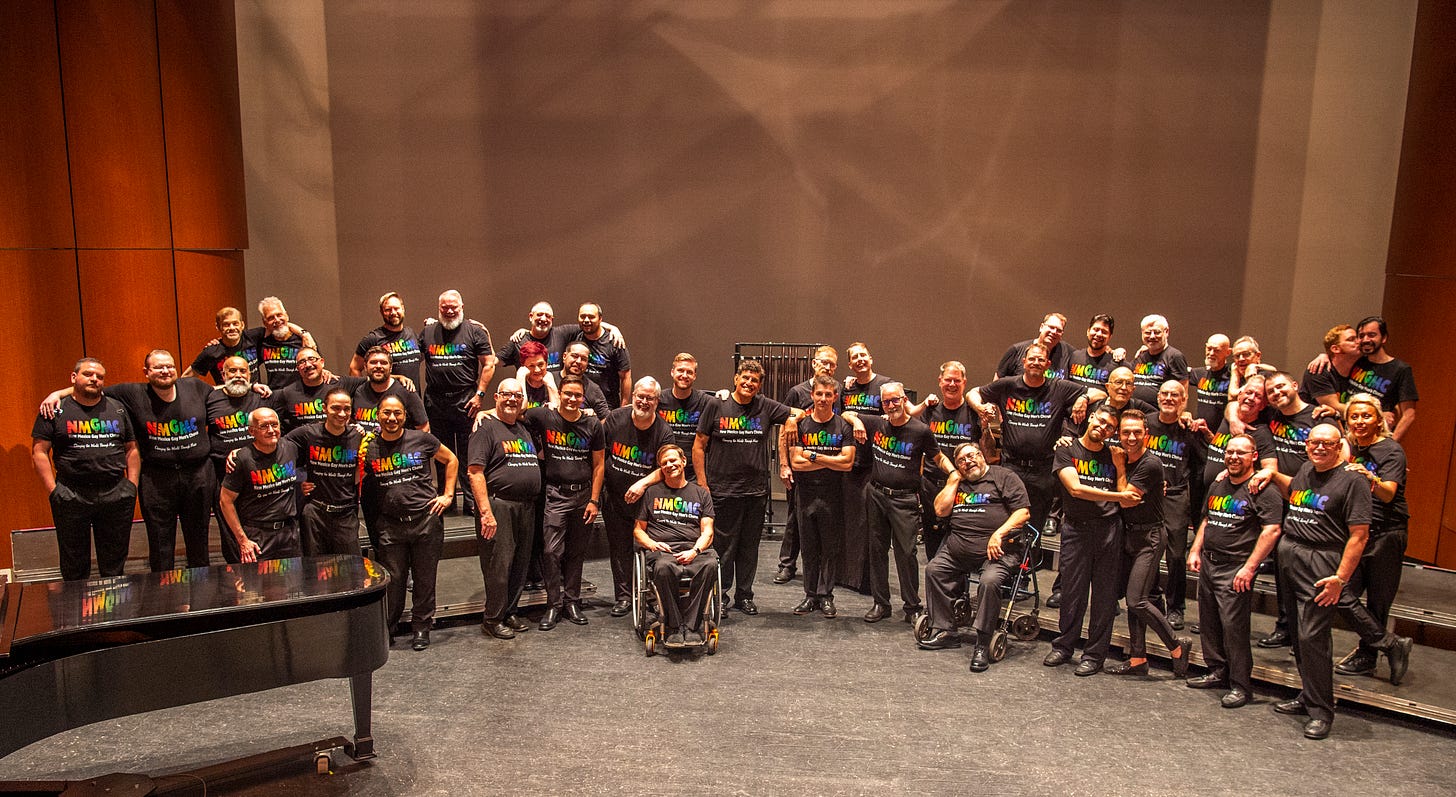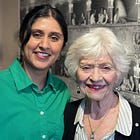🌈 Pride Special: Presenting authentically, without fear
A candid conversation about identity, queerness, and joy with UBC voice professor and baritone J. Patrick Raftery and his former student and tenor Spencer Britten
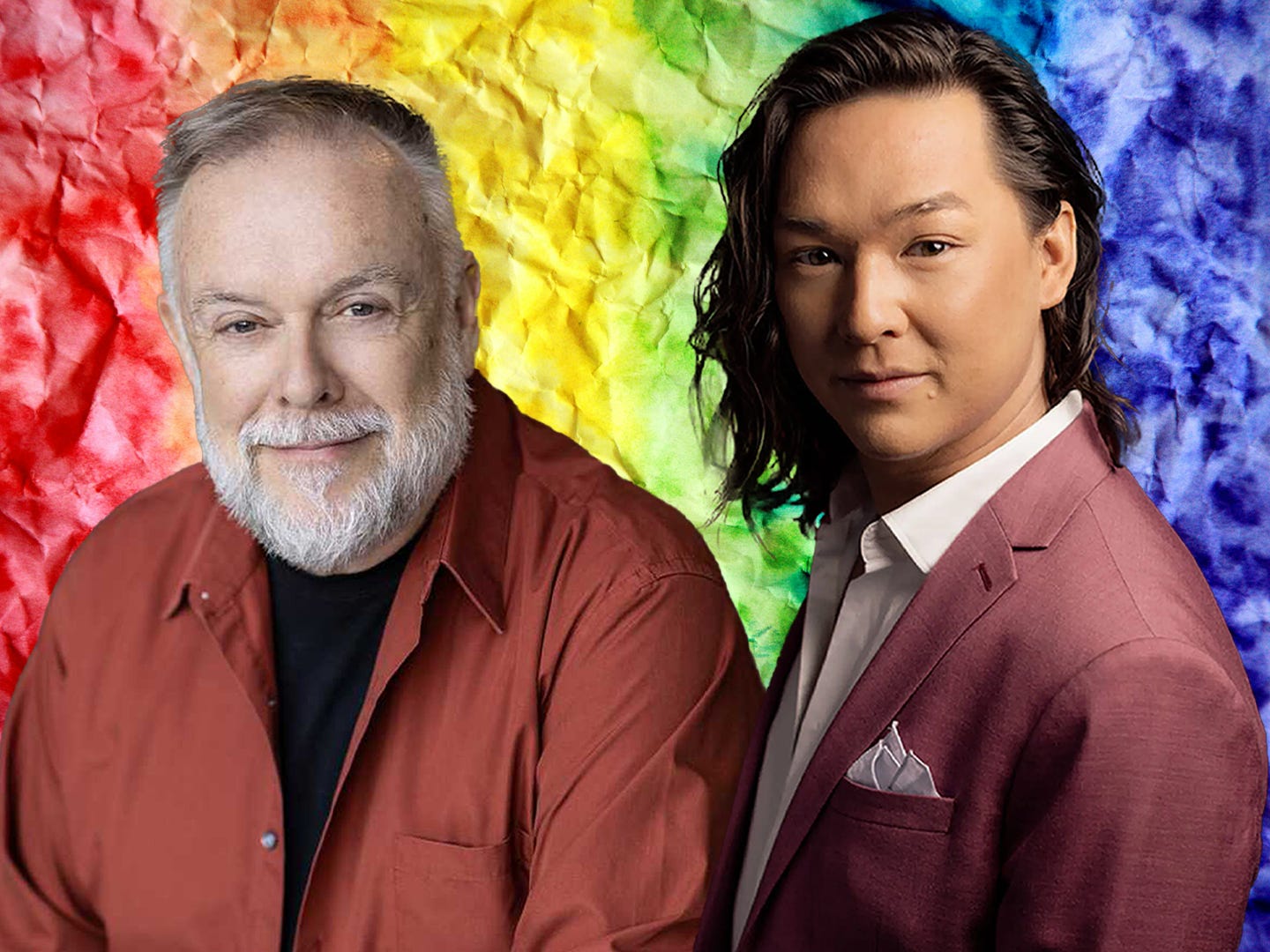
You can also download the podcast on all major platforms including Apple Podcasts and Spotify.
Vancouver Opera honours the start of Pride Season with an exciting and moving conversation between acclaimed Baritone and UBC Professor, J. Patrick Raftery, and Canadian Tenor, Spencer Britten. Patrick is about to launch his all-queer reimagining of Maurice Ravel's L'heure espagnole as A Spanish Hour?, with two performances on July 27th in the Telus Theatre at the Chan Centre for the Performing Arts. Tickets will are available here. Follow our social media to find out more.
J. Patrick Raftery:
Well, L'heure espagnole is a lovely one-act comedy by Ravel, that is about a person exploring their sexual freedom. In the original version, it's a woman who is taking advantage of her husband being out of the house for one hour a week, and her lovers come and visit her.
When I saw it years ago, in the early '80s or the late '70s, when I saw it I was like, "Wow, this is just like all of the queer people that I know." I immediately starting seeing Concepción as a genderfluid person and I definitely saw the characters because nothing actually happens on stage. It's a typical French farce where everybody's trying to do something but things keep blocking them so they keep getting interrupted.
I do think that Ravel made a subtle joke by calling it The Spanish Hour because it's only about 47 minutes long. It's not actually an hour long. Probably, in a real Spanish hour, where you're meeting your lover that one time in the week, it probably lasted a little bit more than an hour. That's where my idea for A Spanish Hour? came from.
Ashley Daniel Foot:
Queer opera, what does that all mean? What's the link there?
J. Patrick Raftery:
Oh my gosh. For me, I think I've been looking at things for 50 years now and really interpreting my perspective onto opera that I've seen. How I relate, how when I'm performing something, how I relate to it.
But now recently, I really see things coming that have content that relate to our community and relate to us in a completely different way. I'm not interpreting myself onto Rodrigo and Don Carlos, who maybe there's some historical justification for thinking that some homosexual feelings, that character.
And in Pearl Fishers, too.
I don't know, I was always interpreting my things, myself onto things. Now I feel like I'm finding things that are more related that bring something to me from our community instead of the other way around, if that makes sense.
Ashley Daniel Foot:
Spencer, what about you? What has your relationship been to opera as a queer person? How have you found yourself in the work?
Spencer Britten:
It's been a very interesting journey for me, identifying as a queer person, and learning about my queerness as I matured and age as an artist and as a human. I think for me, one of the big things that I learned was I never really fit into the box that are prescribed for artists in the operatic industry. No matter how much I tried to fit into a box, it just wasn't working for me. That led me to just embrace my authenticity, which is something I've become known for in the industry. It in turn has led me towards projects that have really allowed me to embrace who I am, and that I do have a place in this industry exactly as I am as a person.
One of those events was the Messiah/Complex during the COVID pandemic. Joel Ivany asked me, "Who is Spencer and how do we represent that through this piece of music?" That was the first time anyone has ever asked me to represent myself in the art form. It's always, "How do you interpret this character? What is the music telling you?" But this was the first time I was able to really think about it. I really did have to think about who I was and how I wanted to present that.
That gave me a big jumpstart to my career and led me to projects like Chinatown, which was a queer immigration story about Chinatown in Vancouver, which was another amazing experience for me.
Now we're doing A Spanish Hour?, which is allowing me to embrace my queerness in a reimagining. Not just contemporary opera, but a more traditional opera, but reimagined with a queer lens.
Ashley Daniel Foot:
You talked about Joel Ivany asking for you to reflect yourself in Messiah/Complex and it's an incredible thing. I want you to tell us a little bit about how you went through that process. How did you discover who you were and how did you reflect that? How does your queerness play into that?
Spencer Britten:
During school, I started taking my mental health very seriously because I grew up in the theatre. That pushed me to be playing a role at all times, trying to do whatever I could to get the part or be the best. I was always thinking that theatre was my personality.
Then in school, I realized that I had compartmentalized the different facets of myself. Whether that's my personal life, or my dancing belonged in the dance studio and my signing belonged on the stage, or whatever. It was all compartmentalized. As soon as I started realizing that my artistry was benefiting from everything cross-pollinating, I started taking it very seriously on figuring out who I was and where those different compartmentalized parts of myself intersected. It just kept going from there. I just took it very seriously, from I guess my late teens until now.
I think moving to Berlin during the pandemic was a huge eye-opening experience for me. Just moving across the world is already difficult enough, but doing it in the thick of a pandemic when everything is shut down, I think just really showed my resilience. And really boiled it down to, "Okay, who is Spencer and what do they need to survive in this world?" I think that's where my authenticity was born or revealed, because it just took away all the frivolous stuff that I didn't need and that I was putting on for the rest of the world. It allowed me to just exist and be who I needed to be. Everything else was too exhausting to be putting on an act the whole time.
Ashley Daniel Foot:
What was the biggest change that you think happened then, in that period?
Spencer Britten:
Berlin is just such an open space. The queer community in Berlin is so vibrant and accepting. I found my little corner of the world, my karaoke bar in Berlin that just welcomed with open arms. That really became my safe space.
Something that became very important for me through the pandemic and through working in Berlin was finding who I was outside of opera because opera can be so all-encompassing.
I took opera very seriously for a long time. I remember in lessons with Patrick at UBC, I would do opera all day at school, be in rehearsal all night, and then go home and watch opera. Go home and study my score. Patrick told me, "You know, Spencer, there's this thing called Netflix that you might want to check out sometime."
That was the push I needed to start figuring out who I was outside of opera. That gave me the balance to navigate a very difficult career. It's a very demanding career. Finding these things, like the karaoke bar, that I could go to, and relax, and enjoy, that would make me feel good no matter how opera was going. If opera was going great, I could celebrate with karaoke. If opera was going terribly, I could go and celebrate with karaoke. I just had things there that I could grab onto.
Ashley Daniel Foot:
I have to ask, what was the piece that you used to work out all of this at karaoke?
Spencer Britten:
I think my greatest hit that got requested the most by the employees there was It's All Coming Back to Me Now by Céline Dion.
Ashley Daniel Foot:
Classic.
Spencer Britten:
Had to represent Canada.
Ashley Daniel Foot:
Stone cold classic.
Spencer Britten:
I put the audience through a marathon; but I hope I gave them a show.
Ashley Daniel Foot:
Spencer was talking a little bit about the way that you guys know each other, as Spencer was your student, Patrick. You have undoubtedly been a mentor to so many young queer folks over the years. I think that must be a huge responsibility. But I think now more than ever, as their stories are tumbling out of the closet and we're crafting narratives that reflect them on the stage, how do you reckon with that responsibility?

J. Patrick Raftery:
For me, the best way to mentor people is by example. I don't think that you can really lecture at people that, "You have to do this way or that way." I think that mentorship to gay people and to other queer people needs to be, "I'm creating this project to bring forth people who are out in the career, who are comfortable within themselves."
It's very different than when I was young. When I was young, it was all about representing other people. Even in acting classes and everything, we studied that. We studied how to take ourselves out of it and put the character into it.

That exploration was completely opposite to what's happening now, which I think is so exciting. Where everybody wants to represent themselves and everybody wants to be themselves. I'm happy that I'm getting to work on both of those things.
In terms of mentorship, I speak very openly and I'm very comfortable about referencing my queerness and my queer self, and that my studio is a safe space. But much younger university age people, they need to feel comfortable sharing that information with me. I would never try to bring that, because I don't think it's necessarily relevant to the day-to-day work in the studio.
Ashley Daniel Foot:
When you look at our art form as a queer person, did you always see a place that was there for you professionally as well as personally? Talk a little bit about that.
J. Patrick Raftery:
I had a very confident ego when I was a young singer. I knew I was going to make a place, I never thought about it one way or the other. But I had got put forward for an interview with The Advocate in 1980, '79 or '80. The very first question they said was, "How do you feel being an out gay opera singer?" I was like, "Well, you can turn off that Walkman." I feel now I was naive in the fact of not thinking, of course it was The Advocate, that they were actually interviewing me about being gay.
But I was more like the people of that time, Jodi Foster and everybody who, if you came out, it would really impact your work in a negative way. I grew up finding my way in the field and having great success doing all sorts of typical stereotypical people.
The themes of opera are all for all of us. All of the themes of love, and jealousy, and hatred, and ambition, those are all themes for all of us. But as I've gone along, it is frustrating to me that, after such a long period of time, I've never performed a gay person on stage. I've done lots of intimate scenes with women and I love being intimate with women. It's just that I'm a queer man. I never had any problem being intimate intellectually or working on stage with women, I loved all of the work that I did. But I've never actually done a scene of intimacy with another man on stage, which is interesting I think at this point.
Ashley Daniel Foot:
I want to push on that a little bit and ask about the opera as being a space of safety for queer people historically. I think there's no doubt that it has been.
But the themes of the operas, maybe not so much. Why do you think that is? How do you think that relates to this journey?
J. Patrick Raftery:
In retrospect, you can see that it's hard to say all opera. But I can pretty confidently say all opera is used as a political movement of its time. Certainly, Verdi was. Certainly, a lot of the stories that reinforce certain religions or Christianity, where the woman, if she's having too much fun, has to die at the end, which is typical of a lot of Italian operas. There was certainly political movements that supported big festivals in many places, of which I'm a great fan. I think that it's always been not a protest, but a reflection of the society.
I think Gianni Schicchi was a reflection of the society at its time. Rigoletto certainly was. Tristan und Isolde certainly was. Just like Carmen right now at Vancouver Opera, certainly that was a reflection of its time. But also, it is pertinent for our time.
I think that creating spaces for queer people to be seen, and to see lots of people of colour, and lots of leading men and leading women who are not the stereotypical Barbie and Ken types that people often see. We really can explore a lot of different kind of love, and intimacy, and fun, and comedy, and everything that reflects the queer community because all of that is in the queer community.
Ashley Daniel Foot:
This is not an easy thing, to fully embrace who you are. There's a bravery that comes, for both of you, I can hear in your answers. But you've stepped boldly forward, and I'm sure not without some trepidation. What has surprised you or what has disappointed you as you've started to go down this path?
Spencer Britten:
It was so interesting for me learning about who I was, starting in North America and then moving over to Europe, because the cultures can be so different. I definitely found that, in both places, I got pushback in different ways. Especially through my social media work, which has become international because of living in both places and working in both places, I'm really putting myself out there. I'm putting myself on a limb by presenting myself authentically in a time where the world is not always so accepting. We're led by people that are not always so accepting, which empowers people to speak out against queer people. It does feel like sometimes I have to build up my courage in order to do it.
I remember I was working at a big opera house recently. I had bought a beautiful dress to wear for opening night because I wanted to present authentically and be myself. It would be the first time I wore a dress at a big opening night, not to mention at a big opera house. I remember texting my colleague that day and I was like, "I don't think I can do it. I don't think I'm brave enough today to do it." She, the wonderful person she is, assured me. She's like, "Well, I'm wearing a Pepto-Bismol colored gown and I'll be right beside you the whole time, if you feel comfortable wearing the dress you bought." So I did.
The people that I thought would hate it the most ... There was a very conservative conductor there, who I thought, "Oh, they're just going to hate this." But I got so many compliments. It was very encouraging to see, even the people I didn't expect to be supportive, to support me. Sometimes it does just take a little bit of courage to do it and to have that support of your friends around you, and it can make all the difference.
The response I get from the younger generation of opera singers who are coming up, who really appreciate me showing up authentically, allowing them to feel confident in showing up authentically, it means so much to me. Again, that first time I experienced that was through Messiah/Complex, with queer people and mixed race people saying how much they appreciate seeing someone that they relate to in the industry.
Ashley Daniel Foot:
One other thing that I think about when I look at queer representation in opera and a lot of popular culture, there's always stories of tragedy. The AIDS crisis looms large in films like Philadelphia. Or homophobia looms large in operas and movies like Brokeback Mountain. I wonder if we're ever able to move to an area where joy can be celebrated, queer joy. How important is joy in the exploration of your work?
J. Patrick Raftery:
I appreciate that question so much because part of what challenges me, so much of what we see is tragedy around the queer community. I luckily survived the AIDS epidemic, but no one can really imagine how one at 23 or 24 feels that doing this activity that feels so natural to you could kill you. Literally kill you.
That just was a strange part of time. But now, I do think that that history is so important. We're 55 years since Stonewall, even though that seems like ancient history. I remember it. I was only 12, but I remember seeing about it in the news and thinking, "Those were my people."
Ashley Daniel Foot:
You knew this at 12?
J. Patrick Raftery:
I knew it at 12, yeah.
Ashley Daniel Foot:
Where did you grow up, Patrick?
J. Patrick Raftery:
I grew up in Washington, DC. My parents were really ... We had the New York Times and the Washington Post. The conversation over dinner was always current events and news. I heard about that. I heard about these riots and I heard who was doing this. I actually don't remember if it was from my parents, or from the neighborhood, or whatever. But I definitely heard it, I remember hearing it. I remember my reaction at that age, thinking, "Those are my people. Those are my people that this is happening to." And that you feel completely differently when those are people that you don't relate to in any way. I was 12, I was very young. But I definitely remember it.
All of the queer people that I know in my circle of friends, we have so much fun! We have a ridiculous amount of fun! Our lives are joyful! We go through all sorts of difficult times, like everyone in their lives. But there's so much fun to be had in the gay community. I would just say, anyone out there, if you want to up at ante on your party and really have a good time, have a great drag queen. Really, getting Sasha, get somebody really fabulous and the party goes out the roof. Until you've experienced that, you really don't know how joyful our community really is.
Ashley Daniel Foot:
I love that. Spencer, you recently performed in an operatic version of Before Night Falls.
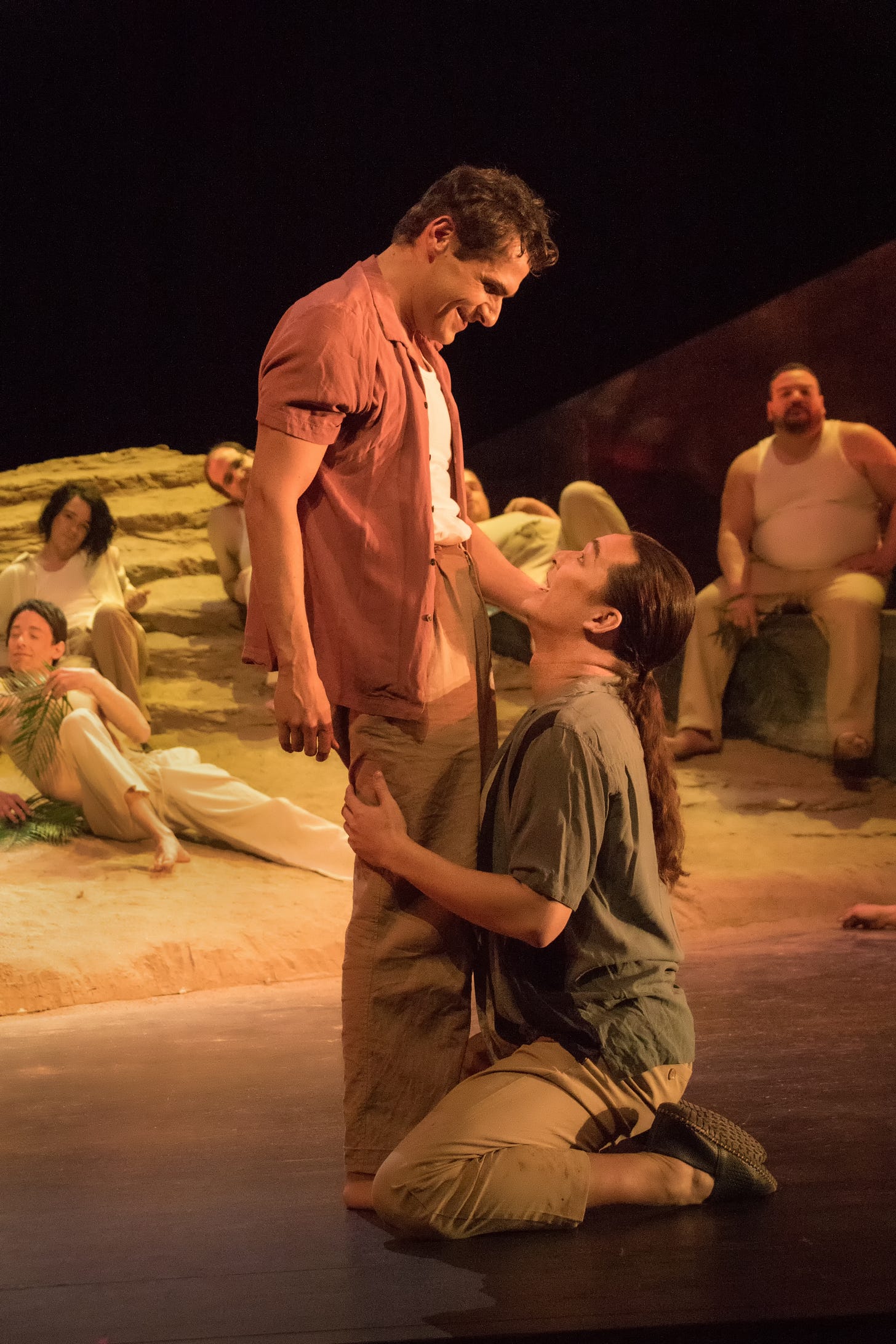
Spencer Britten:
Yes. I feel so lucky that I've been able to portray a few gay characters on stage. I never thought that I would ever be able to. Contemporary music in school seemed so far away. Even gay stories in contemporary music seemed so far away. I think I've done three or four gay characters on stage now, and then countless of others that I have chosen to make gay because it's me and I wanted to add some fabulousness to it.
Before Night Falls was such an incredible experience. One of the things I love about opera, opera is based in history. Before Night Falls is the story of Reinaldo Arenas. I didn't know him at all, but he was such a prolific author and such an important figure for Cubans. Reading his novel, watching the show, the movie-
Ashley Daniel Foot:
The great film, Before Night Falls, by Julian Schnabel.
Spencer Britten:
With Johnny Depp in it, if you haven't seen it.
Ashley Daniel Foot:
Javier Bardem and his Oscar-nominated performance. It's an incredible film.
Spencer Britten:
Incredible film. It was so enjoyable for me to learn about Cuban culture, and Reinaldo Arenas, and all the characters he came across. The book is wild. The opera, I think, is so incredible in representing queerness, especially queerness in Cuba, which is different than what we might know in North America. It's a very different culture, more sexually forward. It was expressed in the opera by Jorge Martin. Fortunately, we had him there! We were doing a new orchestration of the piece as well. Again, it was a very queer environment. We were supported by the New Mexico Gay Men's Chorus.
Even the opera chorus I think is the most gender and sexually diverse chorus I've ever worked with. That was so, so, so incredible for me to just feel that support. Doing a queer opera, a queer role in a room full of queer people, much like we'll be doing in A Spanish Hour?. There's really no better feeling than that feeling of safety in being amongst your people, doing what you love.
Ashley Daniel Foot:
Do you have an advice for any young queer folks who are looking at your social media, listening to your beautiful voice, and trying to reflect a journey that could be safe for them?
Spencer Britten:
I would say take the time to nourish the relationships that serve you because there's going to be a lot of instances where you're going to meet people that don't support what you do and don't support you presenting authentically. Those are not your people, those are not the people you want to surround yourself with. No matter who far we move forward in the industry with acceptance and openness, there is still a ton of people that don't appreciate it and don't support it. Which is unfortunate, but that is the reality.
But there are enough people that are willing to put in the work to make changes. Those are the people you want to work with. Those are the people you want to get to know well. Those are the people you want to approach with project ideas you have so that we can start building a community that supports everyone. It's slow, but we're getting there. The longer I work, the more I see these people rise to positions of power, with enough power to make change. We just got to keep going. Keep going and supporting each other.
Ashley Daniel Foot:
A Spanish Hour? is queer-led. It's filled with a cast that's representative of the queer community. Why was that important to you as you put this project together?
J. Patrick Raftery:
I just felt really very strongly, I don't know, five or six years ago, that it was time for me to be a creative and to create opportunities for people within our community. This was the perfect opportunity. What was so joyful for me, in putting it together, was also that no one had any issues being out.
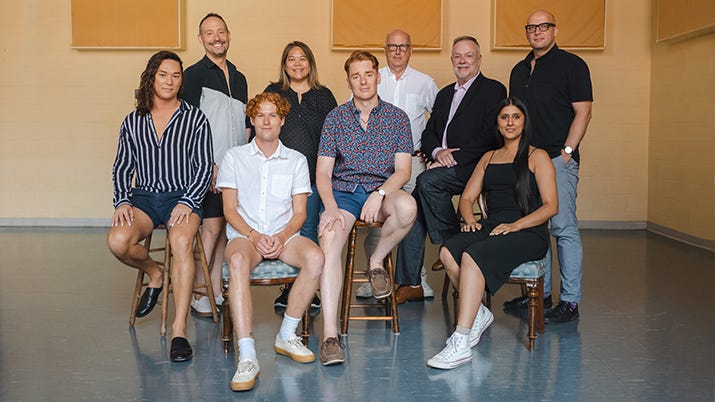
I really reached out to everyone. Spencer, and Simran Claire, and Andrew Love. I said, "I'm doing this specifically because I want to cast all out professional people with management and with a profile. Does anybody have an issue with that?" Everyone resoundingly was like, "No. What are you talking about?" Which for me, was great, because 40 years ago, lots of people would say, "I can't do that," because a lot of people were not closeted within the business, but closeted from the world. It was joyful for me to feel that.
Spencer might remember, but when I was speaking at the Libretto workshop, speaking to everybody, I got really choked up because I've never worked in that environment. Of course, we work in environments all the time where there are lots of people, lots of different kinds of people, and lots of queer people. But you just get so used to reading signs from people or hearing subliminal messaging. When I listen to Tchaikovsky, or Reinaldo Hahn, or Ravel, I hear all of that messaging in the music because that was at a time before Pride, music before Pride and what that was. Now I think it's incumbent on people of my generation who I'm no longer going out and dancing on the floats at the Pride Parade, because that is for young people that I'm very joyful that they are having that experience.
In someone whose in their late 60s, I really feel it's important to give opportunities to those people who I admire in the business, who I respect them, and I want to work with them in a different way. I think it's incumbent on older gay people to be present, to be seen, to be out and open, and also my colleagues and the people that I work with, see who I am and what I am promoting what I'm working on.
One of the things that really surprised me is that I've had nothing but support from everyone, creating this piece. From Rebecca Hass at Pacific Opera Victoria initially, really said, "This is a really good project. This is something you really should go for." The libretto workshop was really supported by the Canada Council and also by the Canadian Opera. The Canadian Opera donated us space to work in.
Then for this, to get it up on its feet, the Canada Council, the BC Arts Council. Doing something like this with Vancouver Opera and with yourself. Really, it's just unbelievable to me because I really thought, "Okay, I'm going to have pushback. I'm going to get resistance for this." I've had nothing but open doors, and support, and everyone say, "This is a valid, really useful project." Which of course, puts a lot of stress on me to do an even better job than I'm planning on doing. I do hope that a lot of people come and see it.
It's going to be in the Telus Theater at the Chan, on July 27th (tickets are available here), which is the weekend Pride starts in Vancouver.
Ashley Daniel Foot:
It's been an absolute delight to welcome J. Patrick Raftery and Spencer Britten to this conversation. I think you'll agree, they just have a natural rapport and lots of fascinating things to say.
You can check our website for more details on A Spanish Hour?. You can also check our website to read about other queer operas that we celebrated last year. As always, thanks to our trusty producer, Mack McGillivray. I'll see you at the opera.
Spencer Britten is a Chinese-Canadian artist “oozing with mirth and personality” (Opera Canada.) His accomplishments in Opera & Musical Theatre have led him to performances internationally with companies including Staatsoper Unter den Linden, Glyndebourne Festival, Lyric Opera of Chicago, Hungarian State Opera, Royal Opera Versailles, Bregenzer Festspiele, and The Glimmerglass Festival. Spencer has sung with the likes of conductors Sir Simon Rattle, Antonio Pappano, and Simone Young. Concert work has been notably punctuated with Yannick Nézet-Séguin and the Orchestre Metropolitain’s Messiah, streamed on Stage+ (Deutsche Grammophon) as well as the critically acclaimed Messiah/Complex with Against the Grain Theatre, representing the queer and asian communities in this all-canadian reimagining. www.spencerbritten.com @spencerbritten
J. Patrick Raftery’s professional debut was in 1979 when he sang Schaunard in La Boheme sharing the stage with Luciano Pavarotti. After his years at The Boston Conservatory and The Juilliard School of Music, Patrick was taken up by The Richard Tucker Music Foundation and C.A.M.I. artists when his career soared and took him to all the major opera houses of the world in less than a decade. With his debut at the Metropolitan Opera with Mirella Freni in Manon Lescaut, Patrick was one of America’s most prominent baritones.
Most recently, J. Patrick Raftery was Father Grenville in Vancouver Opera’s production of Dead Man Walking and made his role debut with Pacific Opera Victoria as Benoit/Alcindoro in Puccini’s La Bohéme. Patrick was a member of the voice faculties at the Universities of Toronto and Western Ontario and in 2014 accepted an appointment with the University of British Columbia where he is currently an Associate Professor of Voice and Opera.
Inside Vancouver Opera is hosted by Ashley Daniel Foot, Vancouver Opera’s Director of Engagement and Civic Practice. Boundlessly creative and fascinated by the way that art is created and presented, Ashley has guided arts organizations across Canada to craft messages and tell unique stories.
At Vancouver Opera, Ashley carefully develops all programming that takes place off the mainstage and looks for unique and unexpected ways to highlight the power of opera in the community. He also manages all education, community partnerships, and guides the company’s commitment to justice, equity, reconciliation, and diversity. He’s particularly proud of his recent collaborations with with the Vancouver Public Library, BC Alliance for Arts and Culture, Vancouver Art Gallery, and Rumble Theatre. He is also the co-chair of the City of Vancouver’s Arts and Culture Advisory Committee.
Inside Vancouver Opera is produced by Mack McGillivray, an audio producer creating shows for radio and podcast. He is passionate about cultivating local community and a lifelong lover of opera.



